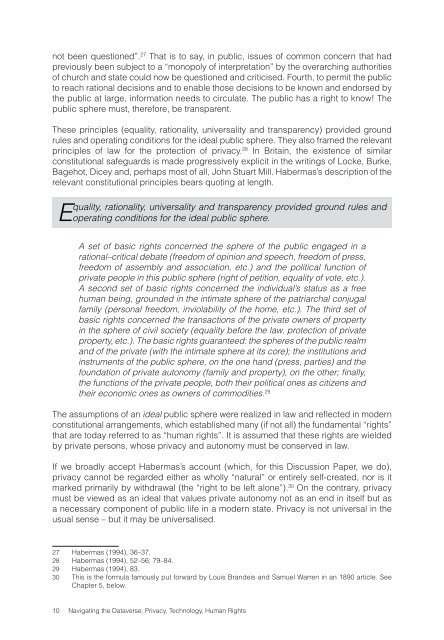Navigating the Dataverse: Privacy, Technology ... - The ICHRP
Navigating the Dataverse: Privacy, Technology ... - The ICHRP
Navigating the Dataverse: Privacy, Technology ... - The ICHRP
Create successful ePaper yourself
Turn your PDF publications into a flip-book with our unique Google optimized e-Paper software.
not been questioned”. 27 That is to say, in public, issues of common concern that had<br />
previously been subject to a “monopoly of interpretation” by <strong>the</strong> overarching authorities<br />
of church and state could now be questioned and criticised. Fourth, to permit <strong>the</strong> public<br />
to reach rational decisions and to enable those decisions to be known and endorsed by<br />
<strong>the</strong> public at large, information needs to circulate. <strong>The</strong> public has a right to know! <strong>The</strong><br />
public sphere must, <strong>the</strong>refore, be transparent.<br />
<strong>The</strong>se principles (equality, rationality, universality and transparency) provided ground<br />
rules and operating conditions for <strong>the</strong> ideal public sphere. <strong>The</strong>y also framed <strong>the</strong> relevant<br />
principles of law for <strong>the</strong> protection of privacy. 28 In Britain, <strong>the</strong> existence of similar<br />
constitutional safeguards is made progressively explicit in <strong>the</strong> writings of Locke, Burke,<br />
Bagehot, Dicey and, perhaps most of all, John Stuart Mill. Habermas’s description of <strong>the</strong><br />
relevant constitutional principles bears quoting at length.<br />
Equality, rationality, universality and transparency provided ground rules and<br />
operating conditions for <strong>the</strong> ideal public sphere.<br />
A set of basic rights concerned <strong>the</strong> sphere of <strong>the</strong> public engaged in a<br />
rational–critical debate (freedom of opinion and speech, freedom of press,<br />
freedom of assembly and association, etc.) and <strong>the</strong> political function of<br />
private people in this public sphere (right of petition, equality of vote, etc.).<br />
A second set of basic rights concerned <strong>the</strong> individual’s status as a free<br />
human being, grounded in <strong>the</strong> intimate sphere of <strong>the</strong> patriarchal conjugal<br />
family (personal freedom, inviolability of <strong>the</strong> home, etc.). <strong>The</strong> third set of<br />
basic rights concerned <strong>the</strong> transactions of <strong>the</strong> private owners of property<br />
in <strong>the</strong> sphere of civil society (equality before <strong>the</strong> law, protection of private<br />
property, etc.). <strong>The</strong> basic rights guaranteed: <strong>the</strong> spheres of <strong>the</strong> public realm<br />
and of <strong>the</strong> private (with <strong>the</strong> intimate sphere at its core); <strong>the</strong> institutions and<br />
instruments of <strong>the</strong> public sphere, on <strong>the</strong> one hand (press, parties) and <strong>the</strong><br />
foundation of private autonomy (family and property), on <strong>the</strong> o<strong>the</strong>r; finally,<br />
<strong>the</strong> functions of <strong>the</strong> private people, both <strong>the</strong>ir political ones as citizens and<br />
<strong>the</strong>ir economic ones as owners of commodities. 29<br />
<strong>The</strong> assumptions of an ideal public sphere were realized in law and reflected in modern<br />
constitutional arrangements, which established many (if not all) <strong>the</strong> fundamental “rights”<br />
that are today referred to as “human rights”. It is assumed that <strong>the</strong>se rights are wielded<br />
by private persons, whose privacy and autonomy must be conserved in law.<br />
If we broadly accept Habermas’s account (which, for this Discussion Paper, we do),<br />
privacy cannot be regarded ei<strong>the</strong>r as wholly “natural” or entirely self-created, nor is it<br />
marked primarily by withdrawal (<strong>the</strong> “right to be left alone”). 30 On <strong>the</strong> contrary, privacy<br />
must be viewed as an ideal that values private autonomy not as an end in itself but as<br />
a necessary component of public life in a modern state. <strong>Privacy</strong> is not universal in <strong>the</strong><br />
usual sense – but it may be universalised.<br />
27 Habermas (1994), 36–37.<br />
28 Habermas (1994), 52–56; 79–84.<br />
29 Habermas (1994), 83.<br />
30 This is <strong>the</strong> formula famously put forward by Louis Brandeis and Samuel Warren in an 1890 article. See<br />
Chapter 5, below.<br />
10 <strong>Navigating</strong> <strong>the</strong> <strong>Dataverse</strong>: <strong>Privacy</strong>, <strong>Technology</strong>, Human Rights
















